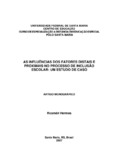| dc.contributor.advisor | Costas, Fabiane Adela Tonetto | |
| dc.creator | Hermes, Rosméri | |
| dc.date.accessioned | 2016-10-07T14:17:52Z | |
| dc.date.available | 2016-10-07T14:17:52Z | |
| dc.date.issued | 2007-12-01 | |
| dc.date.submitted | 2007 | |
| dc.identifier.uri | http://repositorio.ufsm.br/handle/1/2234 | |
| dc.description | Artigo (especialização) - Universidade Federal de Santa Maria, Centro de Educação, Curso de Especialização em Educação Especial, EaD, RS, 2007. | por |
| dc.description.abstract | In the pertaining to school institutions, the inclusive paradigm considers the insertion, the permanence and the success of the pupil with educational necessities special. Initially, these proposals were gifts only in legal documents and the speeches of the universities and the researchers. Sut, later, the implementation of this proposal was attributed the regular schools to it. In the tram of problematic and difficulties that had appeared in this proposal of inclusive education this monographic article is enrolled.
This, objective to analyze the influences of the distant and next factors in the pertaining to school inclusion of a pupil with deficiency cognition. For such, the contributions of Lev Semionovitch Vygotsky and Reuven Feuerstein are used. These theories support the research of qualitative matrix in which if it finds the case study. In this, one considered as subject main the involved pupil with deficiency cognition and as secondary citizens familiar and professionals with the child/adolescent. Still, the following
instruments had been used: the analysis of referring documents to the deficiency cognition of the pupil and to the pertaining to school aspects (PoliticianPedagogical Project); the use of interviews halfstructuralized with familiar and the professionals. In a generalized manner, if it perceived that the distant factors influence in the cognition development of pupils with educational necessities special. Sut, as the
used theories, the influences of the next factors are preponderant. In this way, it is understood urgency to understand the changes and advances in the mental processes of the pupils with deficiency cognition and to rescue the concepts of mediation and experiences of learning mediated in the families and the schools. Moreover, one becomes important to promote the formation of the professionals, the change in practical pedagogical and the overcoming of the existing processes of exclusion inside of the proper pertaining to school institutions. | eng |
| dc.language | por | por |
| dc.publisher | Universidade Federal de Santa Maria | por |
| dc.rights | Acesso Aberto | por |
| dc.subject | Inclusão escolar | por |
| dc.subject | Déficit cognitivo | por |
| dc.subject | Fatores distais | por |
| dc.subject | Fatores proximais | por |
| dc.title | As influências dos fatores distais e proximais no processo de inclusão escolar: um estudo de caso | por |
| dc.title.alternative | The influences of the oistant ano next factors in process of school inclusion: a stuoy case | eng |
| dc.type | Trabalho de Conclusão de Curso de Especialização | por |
| dc.degree.local | Polo de Santa Maria, RS, Brasil | por |
| dc.degree.specialization | Educação Especial, EaD | por |
| dc.description.resumo | Nas instituições escolares, o paradigma inclusivo propõe a inserção, a permanência e o sucesso do aluno com necessidades educacionais especiais. Inicialmente, essas proposições estavam presentes apenas nos documentos legais e nos discursos das universidades e dos pesquisadores. Mas, posteriormente, atribuiu-se às escolas regulares a implementação dessa proposta. Na trama de dificuldades e problemáticas que surgiram nessa proposta de educação inclusiva inscreve-se esse artigo
monográfico. Esse, objetiva analisar as influências dos fatores distais e proximais na inclusão escolar de uma aluna com déficit cognitivo. Para tal, utilizamse as contribuições de Lev Semionovitch Vygotsky e Reuven Feuerstein. Essas teorias amparam a pesquisa de cunho qualitativo na qual se encontra o estudo de caso. Nessa, considerou-se como sujeito principal a aluna com déficit cognitivo e como
sujeitos secundários os familiares e os profissionais envolvidos com a criança/adolescente. Ainda, foram
utilizados os seguintes instrumentos: a análise de documentos referentes ao déficit cognitivo da aluna e aos aspectos escolares (Projeto Político-Pedagógico); a utilização de entrevistas semi-estruturadas com os familiares e os profissionais. De maneira geral, se percebeu que os fatores distais influenciam no desenvolvimento cognitivo de alunos com necessidades educacionais especiais. Mas, conforme as
teorias utilizadas, as influências dos fatores proximais são preponderantes. Dessa maneira, entende-se a urgência de compreender as mudanças e avanços nos processos mentais dos alunos com déficit cognitivo e resgatar os conceitos de mediação e experiências de aprendizagem mediada nas famílias e nas escolas. Além disso, torna-se importante promover a formação dos profissionais, a mudança nas
práticas pedagógicas e a superação dos processos de exclusão existentes dentro das próprias instituições escolares. | por |
| dc.publisher.unidade | Centro de Educação | por |


